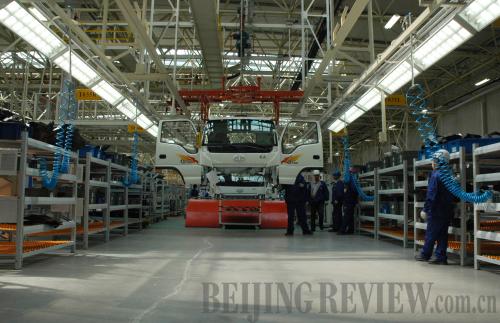|
 |
|
TRUCKING BOOM: Workers of the FAW-GM Light Duty Commercial Vehicle Co. Ltd. assemble light trucks at a new plant in Harbin, capital of northeast China's Heilongjiang Province. With its new production line coming into operation on May 17, the new plant, with an annual capacity of 100,000 vehicles, is capable of exporting up to 6,000 light trucks annually (QIANG YONG) |
Numbers of the Week
$38.8 billion
China received $38.8 billion in foreign direct investment in the first four months of this year, up 26 percent year on year, said the Ministry of Commerce.
101.2 trillion yuan
Assets of China's banking financial institutions had risen 18.9 percent from a year ago to reach 101.2 trillion yuan ($15.57 trillion) by the end of March, said the China Banking Regulatory Commission.
TO THE POINT: China drains excess liquidity out of the market by further hiking the reserve requirement ratio. China offloads its holdings of U.S. Treasury securities for the fifth consecutive month in a bid to diversify its foreign exchange reserves. Home prices remain on the rise in most Chinese cities, though the government has tried to cool the property fever. China's thermal power generators incur painful losses as coal prices soar. E-reader manufacturer Hanvon swims in red ink as sales plunge, possibly due to the iPad's popularity.
Soaking Up Liquidity
The People's Bank of China, the central bank, on May 18 increased the reserve requirement ratio to siphon excess liquidity out of the market. It was the fifth such hike this year after six increases in 2010.
Commercial banks will be required to set aside an additional 0.5 percent of their deposits in reserve, locking around 370 billion yuan ($57 billion) that they could otherwise lend.
China's inflation showed signs of easing, with the consumer price index dipping slightly to 5.3 percent in April from a 32-month record of 5.4 percent in March. But it was still higher above the government-set target of 4 percent for the entire year.
Inflation pressure remains strong so a policy move signaling the central bank's determination to control inflation is still needed, said Wang Qing, Morgan Stanley's chief China economist in Hong Kong.
"Controlling inflation will definitely entail a slowdown in economic growth, but that doesn't indicate there will be a hard landing," he said. "That's why the policy priority at the moment is still to control inflation."
Liu Yuhui, a senior researcher with the Institute of Finance and Banking at the Chinese Academy of Social Sciences, said small and medium-sized enterprises may face more intense difficulties in obtaining bank credit.
One solution for these enterprises is to tap into capital markets like bonds and stocks, he said.
Shedding U.S. Assets
For a fifth straight month, China trimmed its holdings of securities by $9.2 billion in March, according to the U.S. Treasury Department. China retained its position as the largest foreign holder of U.S. Treasury securities with $1.1449 trillion in its portfolio.
Meanwhile, the second largest foreign holder, Japan, continued its net buying, increasing its holdings by $17.6 billion to $907.9 billion. This move eased concerns that the devastating earthquake and tsunami would lead Japan to scale back its purchases and use the capital for reconstruction.
Total holdings of U.S. Treasury securities by all foreign countries rose by $4.9 billion to $4.4792 trillion at the end of March. The securities are key to funding its massive U.S. budget deficits. China's net sales of U.S. Treasury securities amounted to $9.2 billion in March, down from $11.2 billion in last November.
Given a weakening U.S. dollar and rising government debt, worries about safety of China's Treasury holdings are proliferating.
Zhao Changhui, a senior analyst with the Export-Import Bank of China, said dollar depreciation and inflation in the United States would devalue China's foreign exchange reserves, though the U.S. Government is less likely to default on its sovereign debt.
John Silvia, chief economist at Wells Fargo, the fourth largest U.S. bank, said the current U.S. budget situation was unsustainable over time.
"If significant progress is not made, you will probably get a depreciating dollar, probably higher interest rates, higher inflation, which means that many Asian investors will have capital losses on their U.S. treasury portfolios," he said.
Yi Gang, Deputy Governor of the People's Bank of China and Director of the State Administration of Foreign Exchange, downplayed the concerns. "For years, China has spared no effort to diversify investments of its foreign exchange reserves and ensure asset returns and safety," he said.
Property Bull
House prices continued heading north in April, in spite of the government's tough policies.
In April, 56 out of 70 monitored major cities experienced month-on-month increases in prices of new commercial residences, while only nine cities witnessed declines and five cities' prices stood unchanged, said the National Bureau of Statistics.
As for second-hand homes, prices rose in 41 cities in April over March, and 16 cities saw their prices head south.
Policymakers have pushed all their buttons to let air out of the real estate bubble. It is reported that the government is mulling measures to prevent windfall profits of property developers, including windfall tax. Since April 2006, China has been levying windfall tax on the oil industry.
| 